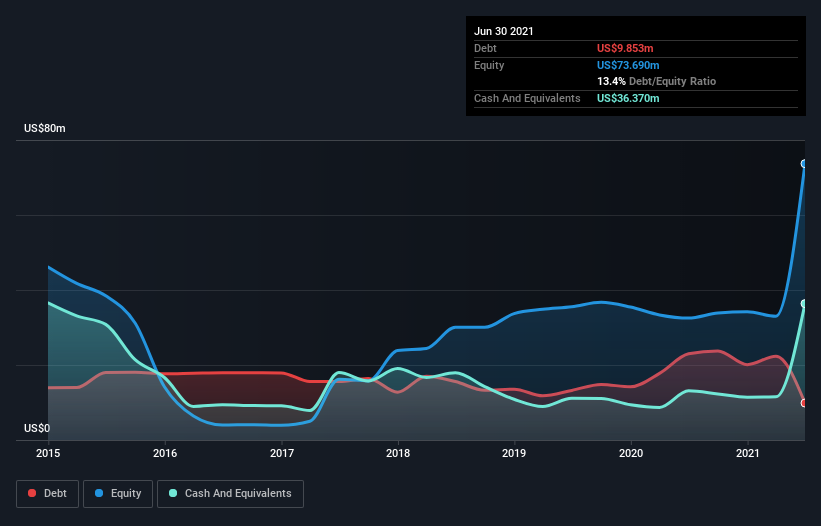Identiv (NASDAQ:INVE) Takes On Some Risk With Its Use Of Debt
Warren Buffett famously said, 'Volatility is far from synonymous with risk.' So it might be obvious that you need to consider debt, when you think about how risky any given stock is, because too much debt can sink a company. We can see that Identiv, Inc. (NASDAQ:INVE) does use debt in its business. But the more important question is: how much risk is that debt creating?
When Is Debt A Problem?
Debt is a tool to help businesses grow, but if a business is incapable of paying off its lenders, then it exists at their mercy. Part and parcel of capitalism is the process of 'creative destruction' where failed businesses are mercilessly liquidated by their bankers. However, a more frequent (but still costly) occurrence is where a company must issue shares at bargain-basement prices, permanently diluting shareholders, just to shore up its balance sheet. Having said that, the most common situation is where a company manages its debt reasonably well - and to its own advantage. When we think about a company's use of debt, we first look at cash and debt together.
See our latest analysis for Identiv
How Much Debt Does Identiv Carry?
As you can see below, Identiv had US$9.85m of debt at June 2021, down from US$23.0m a year prior. However, it does have US$36.4m in cash offsetting this, leading to net cash of US$26.5m.
How Strong Is Identiv's Balance Sheet?
The latest balance sheet data shows that Identiv had liabilities of US$30.1m due within a year, and liabilities of US$2.11m falling due after that. On the other hand, it had cash of US$36.4m and US$17.7m worth of receivables due within a year. So it can boast US$21.9m more liquid assets than total liabilities.
This surplus suggests that Identiv has a conservative balance sheet, and could probably eliminate its debt without much difficulty. Succinctly put, Identiv boasts net cash, so it's fair to say it does not have a heavy debt load!
We also note that Identiv improved its EBIT from a last year's loss to a positive US$21k. The balance sheet is clearly the area to focus on when you are analysing debt. But it is future earnings, more than anything, that will determine Identiv's ability to maintain a healthy balance sheet going forward. So if you want to see what the professionals think, you might find this free report on analyst profit forecasts to be interesting.
Finally, while the tax-man may adore accounting profits, lenders only accept cold hard cash. While Identiv has net cash on its balance sheet, it's still worth taking a look at its ability to convert earnings before interest and tax (EBIT) to free cash flow, to help us understand how quickly it is building (or eroding) that cash balance. Over the last year, Identiv saw substantial negative free cash flow, in total. While that may be a result of expenditure for growth, it does make the debt far more risky.
Summing up
While it is always sensible to investigate a company's debt, in this case Identiv has US$26.5m in net cash and a decent-looking balance sheet. So while Identiv does not have a great balance sheet, it's certainly not too bad. When analysing debt levels, the balance sheet is the obvious place to start. However, not all investment risk resides within the balance sheet - far from it. These risks can be hard to spot. Every company has them, and we've spotted 1 warning sign for Identiv you should know about.
Of course, if you're the type of investor who prefers buying stocks without the burden of debt, then don't hesitate to discover our exclusive list of net cash growth stocks, today.
This article by Simply Wall St is general in nature. We provide commentary based on historical data and analyst forecasts only using an unbiased methodology and our articles are not intended to be financial advice. It does not constitute a recommendation to buy or sell any stock, and does not take account of your objectives, or your financial situation. We aim to bring you long-term focused analysis driven by fundamental data. Note that our analysis may not factor in the latest price-sensitive company announcements or qualitative material. Simply Wall St has no position in any stocks mentioned.
Have feedback on this article? Concerned about the content? Get in touch with us directly. Alternatively, email editorial-team (at) simplywallst.com.

 Yahoo Finance
Yahoo Finance 
